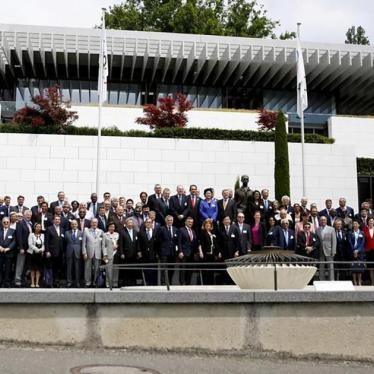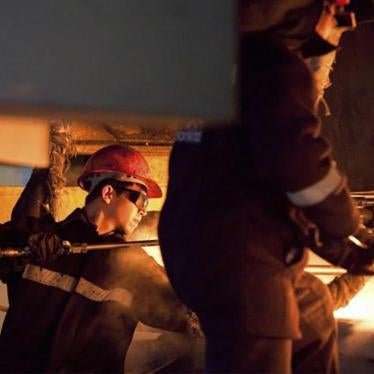Kazakhstan is rolling out a red carpet for the International Olympic Committee’s (IOC) Evaluation Commission this week. The IOC will evaluate Kazakhstan on a range of technical areas to assess Almaty’s 2022 Winter Olympics bid, and Kazakhstan is serious about putting on a good show.
But the IOC should look beyond the efforts to create only positive impressions, and take into account Kazakhstan’s problematic human rights record. The Olympic Charter contains strong commitments to “human dignity” and to upholding press freedoms. In December 2014, IOC President Thomas Bach introduced a series of human rights reforms contained in what’s called the “Olympic Agenda 2020,” with host countries now required to sign a contract that contains an explicit antidiscrimination clause and includes protections for human rights, labor, and the environment.
Almaty’s motto for its bid is “Keeping it Real,” referring to its plans, for instance, to host an affordable and “green” games. Almaty’s bid committee also claims that its “vision is based on the IOC’s Agenda 2020’s far-reaching recommendations.”
It is in the spirit of Bach’s reforms, and Almaty’s promises, that the IOC Evaluation Commission should look at the very real restrictions on media, assembly, and association freedoms in Kazakhstan, as well as discrimination concerns.
Kazakhstan has long imposed tight controls over freedom of expression, and for years has ignored repeated calls to amend a restrictive public assembly law that authorities use regularly in Almaty and other parts of Kazakhstan to justify breaking up peaceful protests that are as small as one or three people. Just last month, the UN special rapporteur on freedom of assembly and association, Maina Kiai, noted the “very limited space for the expression of dissenting views” in Kazakhstan, where “rule by law” trumps “rule of law.” Over the last few years, Kazakhstan has shut down many critical opposition and independent media outlets, and its abusive handling in 2011 of extended labor strikes, subsequent jailing of labor activists and an outspoken opposition leader, and its recent adoption of a law on trade unions curtail freedom of association.
On discrimination issues, lawsuits against an advertising agency for a poster showing a same-sex kiss, and public calls for legislation against same-sex relations, including by some MPs in 2013, expose a problematic record on LGBT rights. In March 2014 the UN Committee on the Elimination of Discrimination Against Women (CEDAW) noted concern about how women seeking justice for sex- and gender-based violence and discrimination “are often hampered by a range of obstacles, such as social stigma and persisting pejorative stereotypes.”
Kazakhstan may be seeking to make a name for itself in international sports. But if the IOC stays committed to human rights reform and carries out a complete and thorough evaluation of Almaty’s bid, then Kazakhstan will only be able to “Keep it Real” by acting quickly on long overdue rights reforms.







